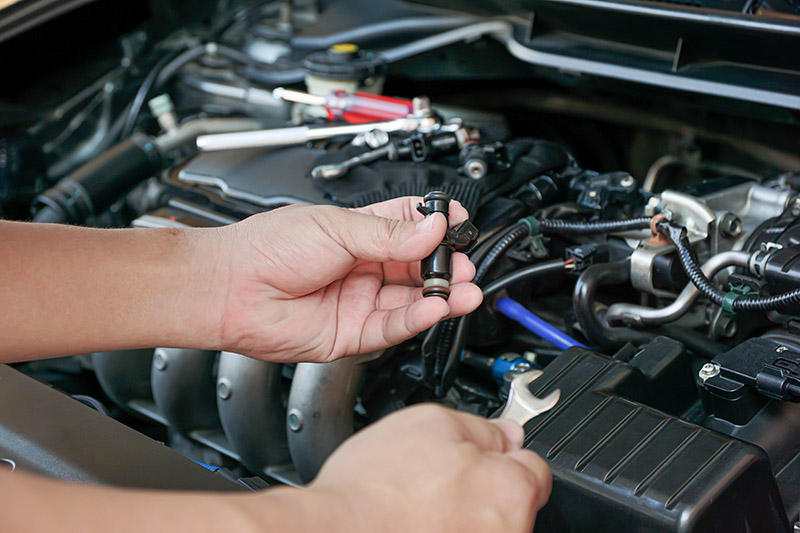
As EVs take over the UK car parc, BG Products wants us to consider how the change will also affect servicing of traditional ICE vehicles and how you can make a profit out of it.
With the advent of electric cars it is time for garages to consider how mobility solutions will change in the coming years. The obvious thing is that electric cars will come to the fore but what is less obvious is how maintenance of internal combustion engines will evolve.
The trend is that people are hanging on to their cars for longer as they wait to see what happens with electric cars and the infrastructure. This means that the maintenance demands will be more than the standard service. This is an opportunity to look after your ICE customer’s cars better, and make more profit too.
The internal combustion engine produces emissions every time there is a combustion event inside the cylinder. Some emissions are dealt with by the advanced emission devices that are on modern vehicles – but not all. Emission devices give a false sense of security about how clean the modern engine is. Any technician that has seen the deposits on an intake valve of a direct injection engine or the soot that accumulates in the oil of a diesel engine will know that not all emissions are dealt with optimally.
DPFs (and soon petrol PPFs) and EGR valves are further testimony to the reality that emissions, an unavoidable by-product of combustion, are still here and is interfering with quality combustion and, ironically, emissions.
What the manufacturers say
All the OEM organisations such as ACEA, EMA, etc. produce a document about fuel and emissions challenges that they face. Included is a clear statement regarding the importance of clean injectors and its impact “in terms of power, fuel consumption and emissions.”
The document confirms that the injectors cannot avoid deposits and the repercussions of dirty injectors. A question worth asking is: “Why, if injectors are critical to emissions and fuel economy, are garages not installing an injector cleaner on every service?”
A standard oil and filter service is not enough for a modern car. Cleaning injectors (and other components, like piston rings) is as logical as changing a fuel filter.
Customer attitudes to enhanced servicing
Before we start to look at offering enhanced maintenance it is important to get past a fear that many garages have. That is that customers “won’t pay for any extras” – this is demonstrably incorrect.
An industry survey showed that 40% of garage customers were unsatisfied with their car servicing. On further investigation, the body carrying out the survey identified that the customers usually had unrealistic expectations. They were expecting their car to drive better after the service than before. These expectations may be a relic of the days when regular changing of contacts and spark plug, and timing adjustments all helped to improve the car’s drivability. These days the engine management system caters for all adjustments and spark plugs are changed less often, so the car drives almost the same after a service.
The survey also showed that only 2 per cent of customer ranked price as the most important feature when choosing a garage. Furthermore, only 2% of customers say that they were thinking of changing garages because of cost.
Another survey (Belluber) shows that 88% of drivers were interested in a service that would help save fuel and lower emissions.
The message is that the customer wants to know more but garages are not educating them on how they could look after their car better.
Petrol Direct Injection
Higher compressions together with low tension piston rings mean more blow-by. This blow-by leads to higher oil convection and eventually oily deposits on the air intake and the intake valves. In addition to this the position of the injectors leads to an increase in deposits which will quickly impact on spray patterns and power, economy and emissions.
Keep injectors clean and keeping piston rings (and ring seats) clean so that they flex and centre properly. This maintains compression and inhibits damaging blow-by. Standard servicing does not, and cannot, remove power-sapping deposits.
Petrol cars are now being fitted with (PPF Petrol Particulate Filter). Drivers are beginning to see issues with PPFs in as little as 9,000 miles.
Hybrid Engines
The intermittent use of the ICE in a hybrid engine means that the fuel is stored for longer in the fuel system. Fuel breaks down quickly. The stop/start nature also means that deposits form in the engine in much less miles than a standard engine. The increase in moisture will in an intermittently running engine will also negatively affect the oil.
Diesel cars
Diesel cars have always suffered from deposits but as mileage mounts will suffer (unless using Enhanced Maintenance) even more. Many parts of the engine (injectors, piston ring seats, EGR, DPF).
BG Products have been used to reduce DPF and injector issues, and improve fuel economy in various fleet operations and independent workshops.









